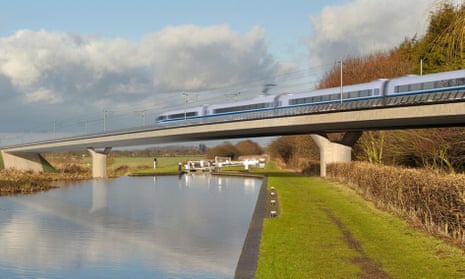Carillion, one of the construction companies working on the HS2 London to Birmingham rail line, is racing to refinance its business after issuing its third profit warning in five months and suffering a collapse in share price.
Shares in the company, which is at the heart of several major building projects in the UK, were suspended eight times on Friday after the shock update to the City that it would breach the terms on its existing lending at the end of the year.
The shares crashed 60% when the stock market opened on Friday – to their lowest ever levels – and closed down 48% at 21.5p. At this price, about 25p, the shares are barely a tenth of the 240p level seen at the start of 2017 and the value of the company is just £92.5m.
Carillion has debts of £1.6bn and analysts expect the company – known for its work on expanding the main stand at Liverpool’s Anfield football ground and its ongoing development of Battersea power station – to have to ask its lenders to swap their debt for shares.
The company employs 43,000 staff, two-thirds of them in the UK, and has contracts with the Highways Agency, Network Rail and the Ministry of Defence. It is building hospitals including Merseyside’s Royal Liverpool and also has a support services operation which has maintenance contracts for buildings.
The government, one of its major customers, said it was being kept informed. “We remain supportive of their ongoing discussions with their stakeholders and await future updates on their progress,” the Cabinet Office said.
Nicholas Hyett, an analyst at Hargreaves Lansdown, described the situation as an ongoing “horror show”. In July, the company issued a profits warning and announced the departure of the chief executive Richard Howson. In September it stunned the City again with another profits warning.
“Some sort of recapitalisation was inevitable, but a possible debt for equity swap, with debt even higher than the group had anticipated, is probably as bad as anyone would have guessed,” Hyett said.
The company said the latest warning to the City was caused by delays to its attempts to sell off some of its public private partnership (PPP) deals, a delay to a “significant project” in the Middle East, and a squeeze on profit margins in some of its support services contracts in the UK.
Carillion aims to arrange the refinancing before April, when the new chief executive, Andrew Davies, is due to start.
The interim chief executive, Keith Cochrane, said “constructive dialogue” was under way with lenders and shareholders. Cochrane has been leading a programme to cut debt, reduce risks and scrutinise the management of each of its hundreds of contracts.
“Whilst we continue to target cash collections, reduce costs, executive disposals and focus on delivering for our customers, it is clear that significant remain and more needs to be done to reduce net debt and rebuild the balance sheet.”
Union officials called for talks with management and said thousands relied on the company for work through subcontracts and agencies. Bernard McAulay, Unite’s national officer for construction, said members needed a “warts-and-all prognosis of the company’s long-term future”.
Talks are already being held about the pension scheme, which has a £587m deficit.
Carillion admitted it needed a “recapitalisation” and said that because of delays to its asset disposal programme and payments on contracts its borrowing for 2017 would be between £875m and £925m.
Last month it secured some new credit facilities and is in talks with its lenders to extend the terms of its debt – relating to the level of money owed to revenue – from the end of December to the end of April.
Andrew Hussey, from stockbroker Peel Hunt, said he was suspending his estimates on the company, while Joe Brent, analyst at Liberum, said he believed at least one of the banks owed money by Carillion had already written off part of its debt.
“Equity does not normally have much value in these circumstances,” said Brent, adding that he expected a debt for equity swap.
When Lloyds Banking Group published its third-quarter results in October it said its bad debt had risen because of a “single large corporate” running into trouble. Lloyds would not comment on whether this referred to Carillion.

Comments (…)
Sign in or create your Guardian account to join the discussion